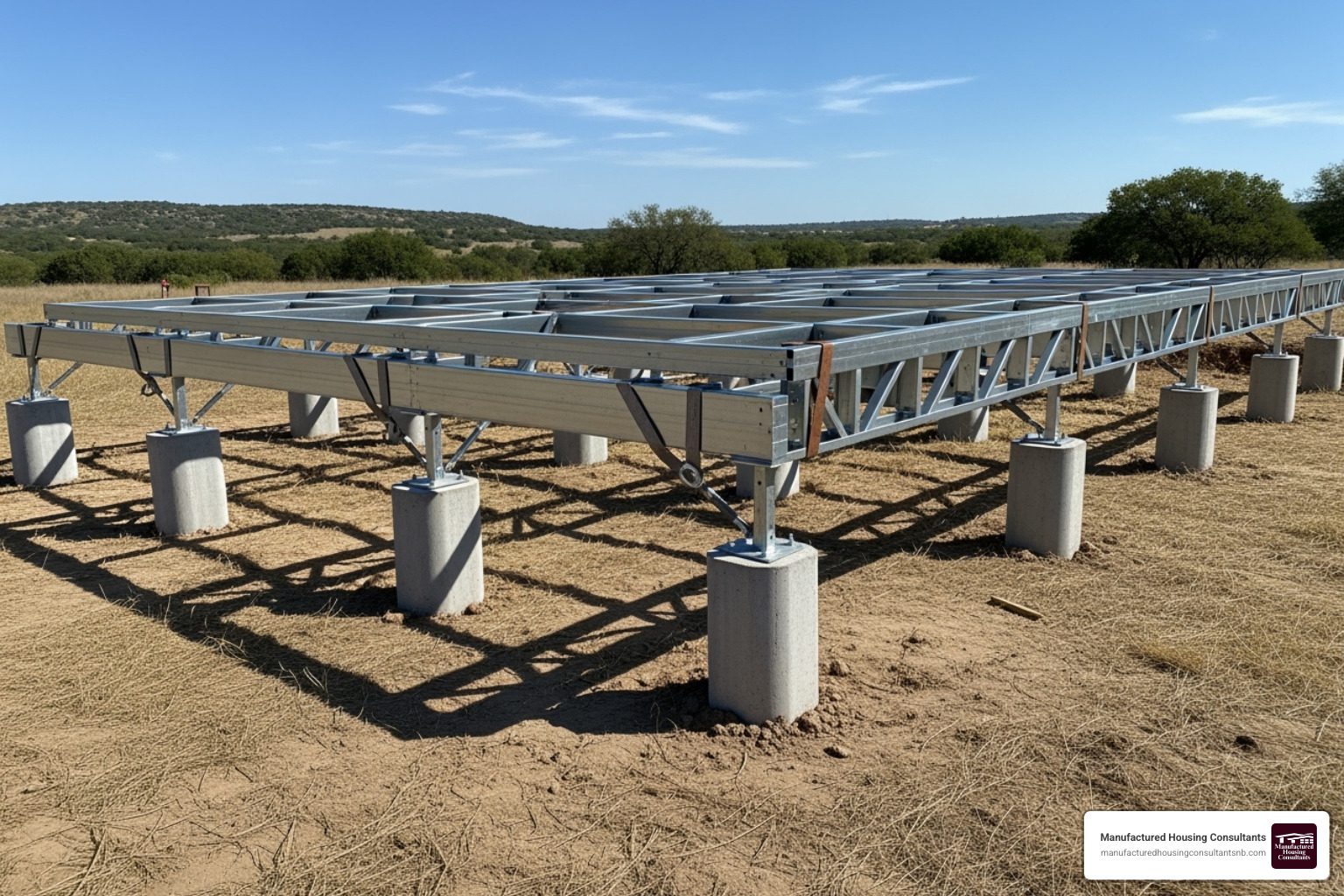From Piers to Basements: Your Guide to Manufactured Home Foundations
Explore manufactured home foundation types: permanent vs. non-permanent, costs, and Texas climate considerations. Choose wisely for your home!
Why Your Foundation Choice Matters
Manufactured home foundation types determine more than just what sits beneath your home—they shape your financing, long-term value, and ability to weather Texas storms. It’s one of the most critical decisions you’ll make.
The 5 Main Foundation Types:
- Pier and Beam: Most affordable ($1,000-$2,000), uses concrete piers.
- Runner: Concrete strips along the home’s length ($2,000-$8,000).
- Slab: A solid concrete pad ($4,000-$9,000), a popular permanent option.
- Crawl Space: Enclosed perimeter with utility access ($6,000-$15,000).
- Basement: Full living/storage space ($12,000-$25,000+), the most expensive.
The key distinction is Permanent vs. Non-Permanent. Permanent foundations (slab, crawl space, basement) are required for traditional mortgage financing like FHA and VA loans. Non-permanent options (pier and beam, runner) cost less upfront but usually limit you to chattel financing.
Your foundation choice impacts:
- Stability & Storm Resistance: How your home handles settling, high winds, and time.
- Financing & Resale Value: Permanent foundations open up better loans and higher home values.
- HUD Compliance: Essential for insurance and loan approval.
In Texas, factors like expansive clay soil, frost lines, coastal flood zones, and local codes are crucial. The wrong choice can lead to costly structural damage. At Manufactured Housing Consultants, we guide New Braunfels-area families through these complexities, ensuring you get a foundation that protects your investment and fits your budget.
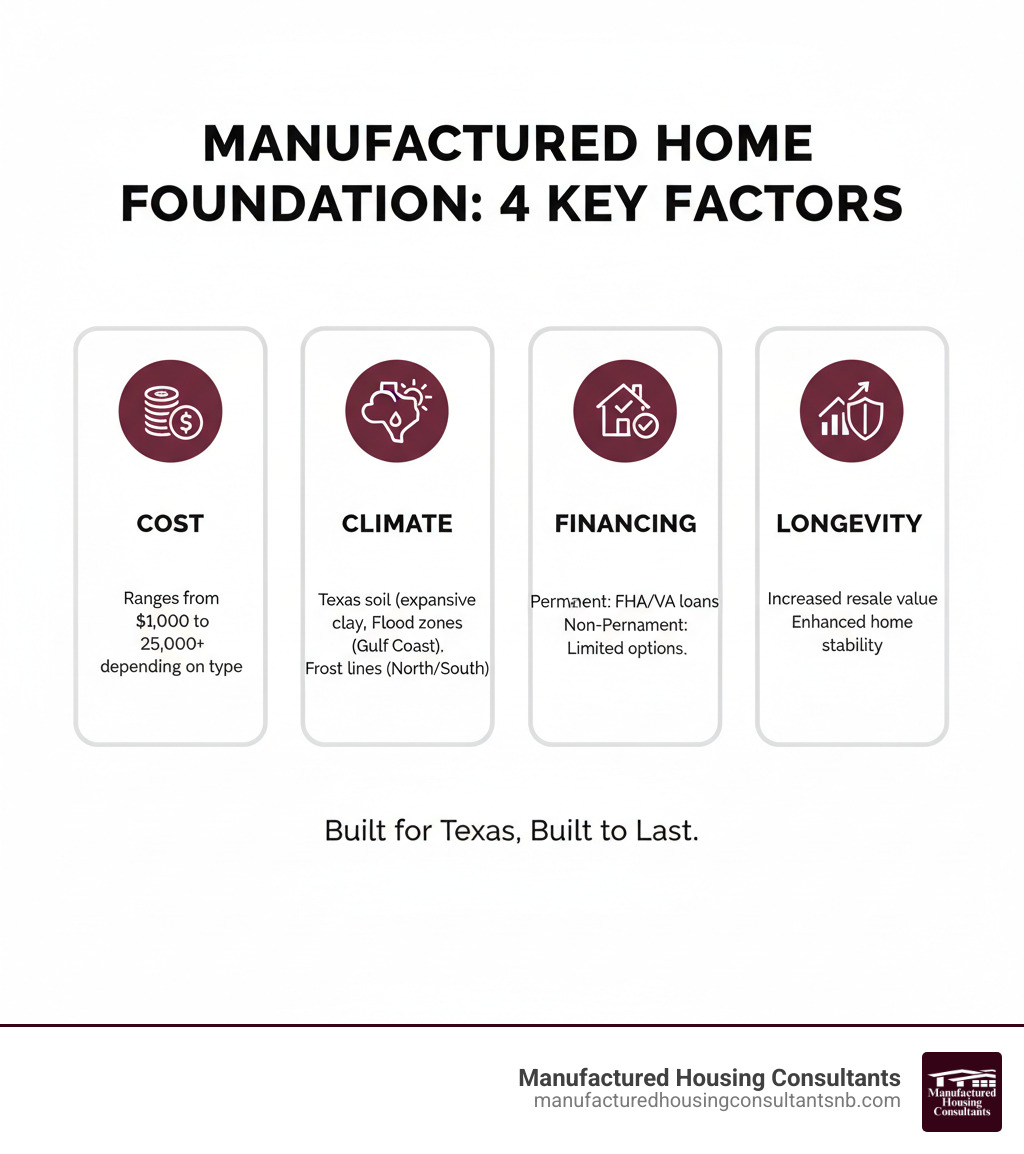
Simple manufactured home foundation types word guide:
An In-Depth Guide to Manufactured Home Foundation Types
The foundation you choose is the bedrock of your investment, affecting everything from safety to financing. As experts in New Braunfels and across Texas, we at Manufactured Housing Consultants guide families through these crucial decisions. Let’s explore the manufactured home foundation types to find the right fit for you.
Permanent vs. Non-Permanent Foundations: The Critical Distinction
The most important factor is whether a foundation is permanent or non-permanent. This classification directly impacts your financing, legal status, and home value.
A permanent foundation, as defined by HUD, must use durable materials (concrete, masonry) and anchor the home to the land. It requires certification by a professional engineer to meet FHA or VA loan standards. This process legally converts your home into “real property,” allowing it to appreciate like a site-built home. For technical details, see HUD’s Permanent Foundations Guide for Manufactured Housing.
A non-permanent foundation supports the home but isn’t anchored in the same way. While less expensive upfront and technically allowing for relocation, this choice has major financial implications. Homes on non-permanent foundations are considered “personal property,” limiting you to chattel loans (like a car loan) which often have higher interest rates and shorter terms than traditional mortgages. Our Manufactured Home Financing Requirements Complete Guide covers this in detail.
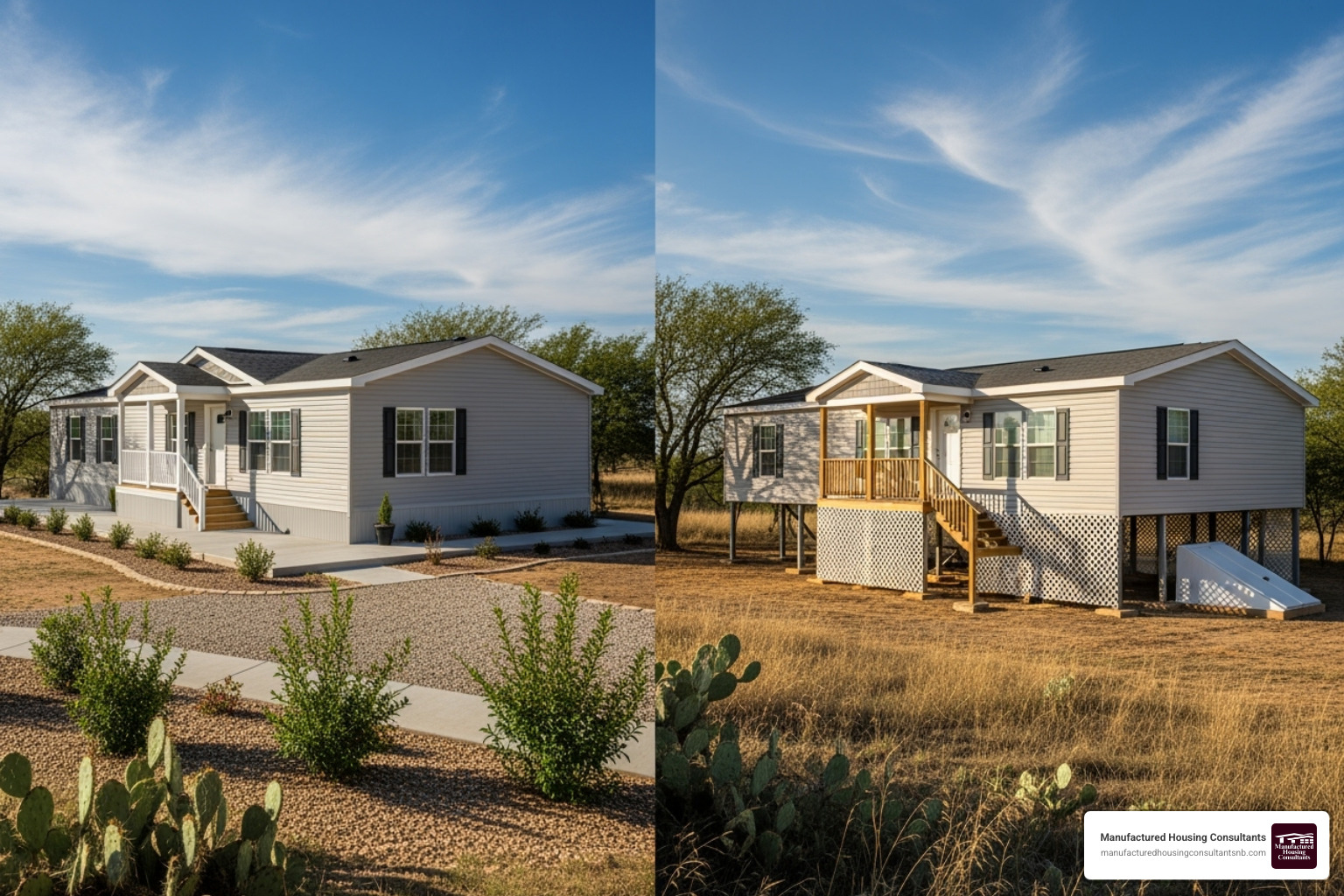
Common Non-Permanent Manufactured Home Foundation Types
Non-permanent options are popular for their affordability and quick installation. They are a common subject in our Mobile Home Foundation resources.
Pier and Beam Foundation
This is the most common and affordable type in Texas. Concrete piers are set below the frost line, and the home’s steel chassis is secured to them with straps.
- Pros: Very affordable ($1,000-$2,000), fast installation (often 1 day), easy utility access, and good for flood zones. The piers can be adjusted to re-level the home, which is useful in Texas’s expansive clay soils.
- Cons: May require periodic re-leveling, needs skirting for a finished look, and is considered non-permanent, generally disqualifying it for FHA/VA loans.
Runner Foundation
This system uses continuous concrete strips or “runners” poured along the length of the home.
- Pros: Relatively inexpensive ($2,000-$8,000) and quick to install (2-3 days).
- Cons: Only suitable for flat, well-drained ground. It can have durability and ventilation issues and is also considered non-permanent for financing purposes.
Exploring Permanent Manufactured Home Foundation Types
Permanent foundations offer superior stability, increased home value, and eligibility for better financing. They integrate your home with the land, much like a traditional site-built house.
Slab Foundation
A slab is a solid concrete pad poured onto a prepared base. The home is placed directly on top.
- Pros: An economical permanent option ($4,000-$9,000), provides excellent support, deters pests, and qualifies for FHA/VA loans.
- Cons: Utility repairs are more difficult as plumbing is embedded. Not ideal for steep slopes, and can be prone to cracking in cold climates if not properly insulated.
Crawl Space Foundation
This foundation creates an enclosed perimeter, elevating the home to provide an accessible space underneath.
- Pros: Excellent utility access, good for sloped lots, and offers some storage. It qualifies as a permanent foundation for FHA/VA loans. Cost is typically $6,000-$15,000.
- Cons: The primary concern is moisture control; proper ventilation and a vapor barrier are essential to prevent dampness and mold.
Basement Foundation
A basement is the most robust option, creating a full-height living or storage area beneath the home.
- Pros: Can double your home’s usable square footage, significantly increasing its value. It offers superior structural support and weather protection. As a permanent foundation, it qualifies for FHA/VA loans.
- Cons: It’s the most expensive option ($12,000-$25,000+) and is not recommended for flood-prone areas. Learn more about a Basement Foundation for Mobile Home.
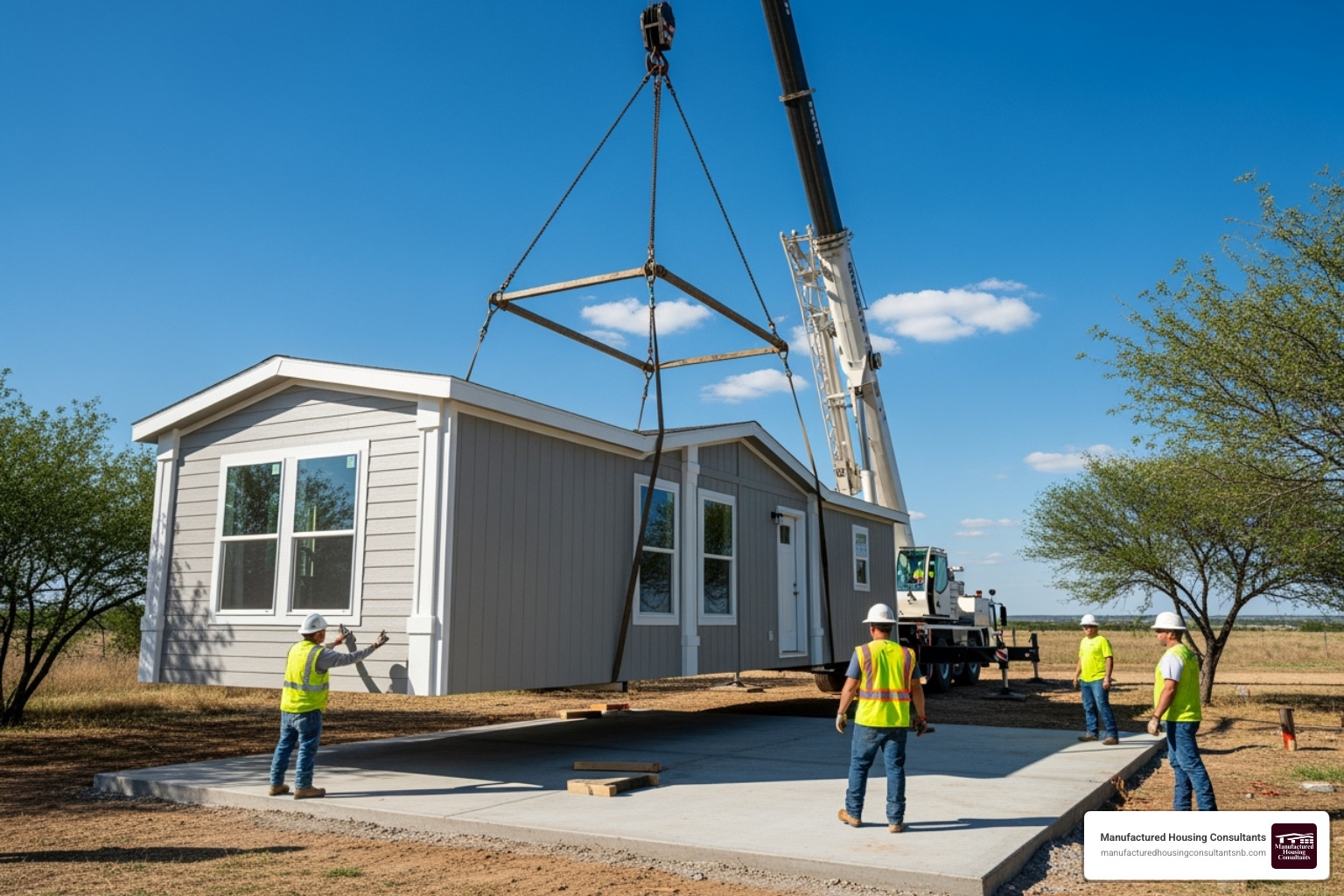
Cost, Timelines, and Financing
Here’s a quick comparison of the different manufactured home foundation types:
| Foundation Type | Average Cost (Range) | Installation Time | Permanence (HUD) | FHA/VA Loan Eligible |
|---|---|---|---|---|
| Pier & Beam | $1,000–$2,000 | 1 Day | No | No (generally) |
| Runner | $2,000–$8,000 | 2-3 Days | No | No (generally) |
| Slab | $4,000–$9,000 | 5-7 Days | Yes | Yes |
| Crawl Space | $6,000–$15,000 | 7-10 Days | Yes | Yes |
| Basement | $12,000–$25,000+ | 10-14 Days | Yes | Yes |
Costs and timelines are estimates and vary by location and project specifics.
To qualify for FHA, VA, or conventional loans, a permanent foundation must be certified by a professional engineer to meet the HUD code. This certification allows the home to be classified as “real property,” open uping access to better mortgage rates and terms. Without it, the home is “personal property,” typically requiring a chattel loan. While we can help buyers explore options like How to Get a Mobile Home with Bad Credit, a permanent foundation provides the most favorable financing path.
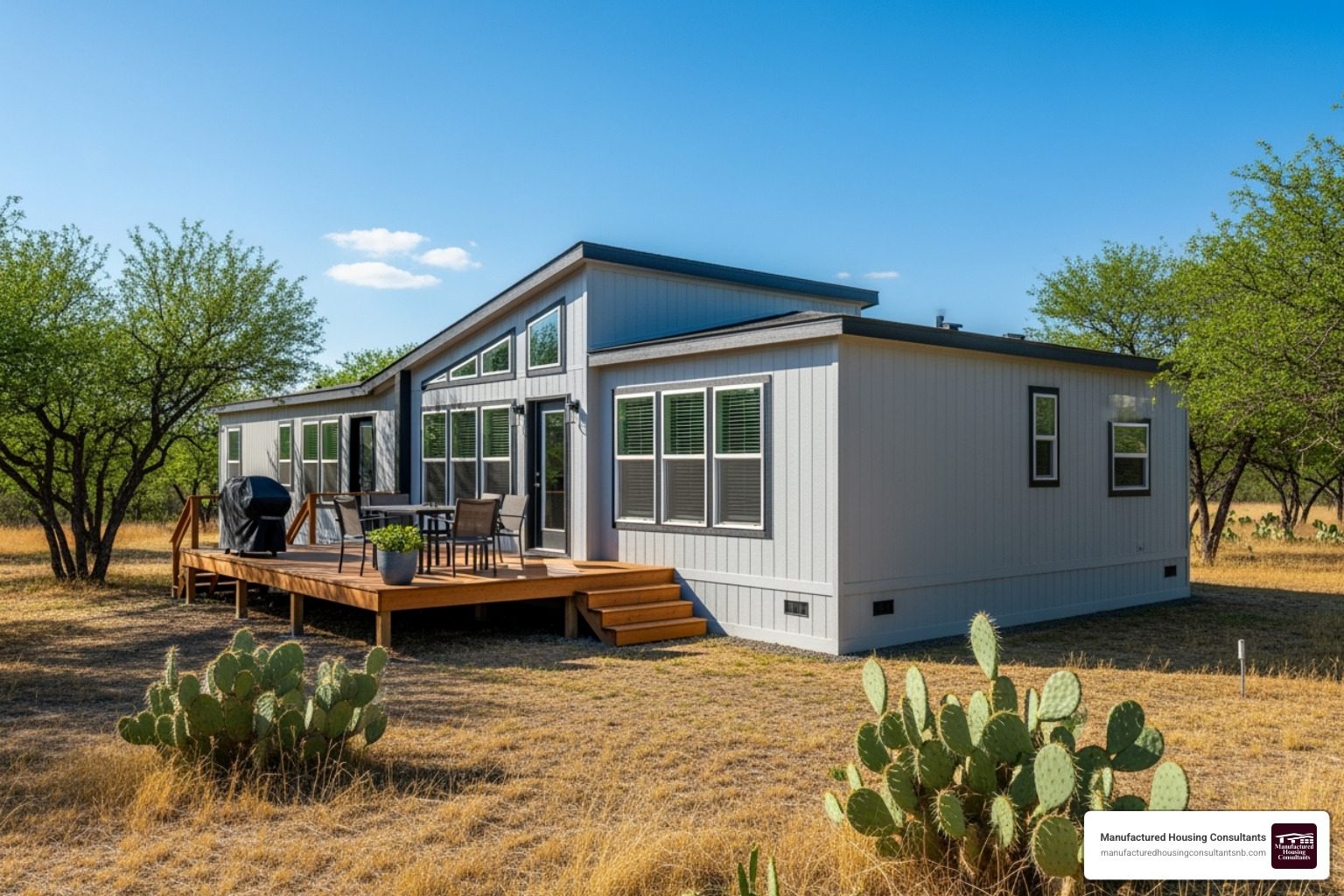
Choosing the Best Foundation for Texas Climate and Soil
Texas’s diverse geography demands a custom approach to foundations. Our local expertise in New Braunfels and across the state is key to navigating these challenges.
- Expansive Clay Soil: Common in Central Texas, this soil swells and shrinks, putting immense pressure on foundations. Pier and beam foundations can be adjusted, while permanent options require special engineering to prevent cracking.
- Frost Lines: Northern Texas has deeper frost lines than the south. Foundations must extend below this line to prevent damage from freezing and thawing ground.
- Floodplains: Along the Gulf Coast and rivers, homes in floodplains must be liftd above the base flood elevation. Raised pier and beam or liftd permanent foundations are necessary. Basements are not an option here.
- High Winds: From hurricanes to tornadoes, Texas homes need foundations with robust anchoring and tie-downs engineered to resist significant wind loads.
- Local Building Codes: Requirements can vary by county and city. We have extensive knowledge of local regulations to ensure your foundation is compliant.
A professional site evaluation is non-negotiable. We work with licensed professionals to assess soil, drainage, and other factors to recommend the most durable manufactured home foundation types for your property. To get started, please contact us for an expert consultation.
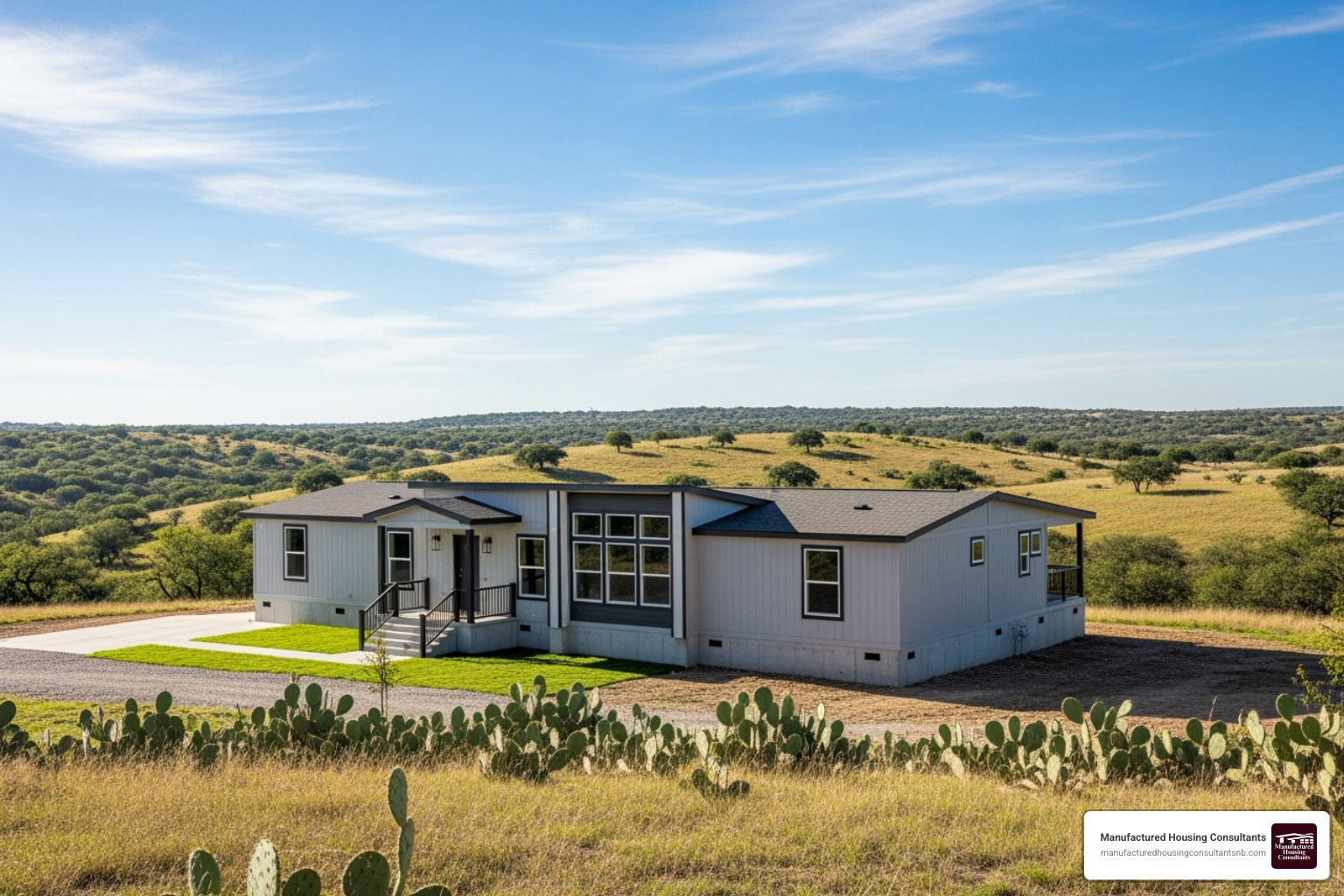
Making the Right Choice for Your Texas Home
Choosing from the various manufactured home foundation types is a major decision, but you don’t have to make it alone. Your foundation determines your financing options, protects your home from Texas weather, and secures your family’s investment.
To recap: Permanent foundations (slab, crawl space, basement) classify your home as real property, qualifying you for FHA/VA loans and boosting resale value. Non-permanent options (pier and beam, runner) offer lower upfront costs but may limit you to less favorable chattel loans.
In Texas, factors like expansive clay soil, coastal flooding, and high winds make professional guidance essential. A foundation that works in one county might fail in another. This is where our local expertise shines. At Manufactured Housing Consultants, we’ve helped countless families in New Braunfels and across Texas select the right foundation. We understand the local soil, climate, and building codes needed to ensure your home is safe and compliant.
We’ll help you choose the foundation that fits your land, budget, and goals. We offer guaranteed lowest prices, homes from 11 top manufacturers, flexible financing, and complete land improvement services, including expert foundation installation. We’re your partner in building a secure future on solid ground.
Ready to take the next step? View our available homes and contact us today. Let’s put our New Braunfels expertise to work for you.

